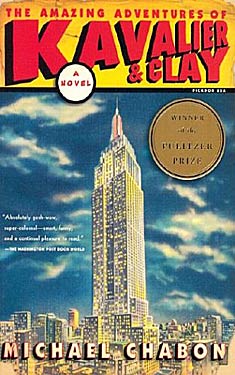Michael Chabon
Completed 9/19/2020, Reviewed 9/20/2020
4 stars
I didn’t think I’d like this book because I disliked his Hugo and Nebula winning The Yiddish Policeman’s Union. What I disliked about that book was the prose. It was overwrought and pretentious. I had similar feelings with this book. I found the prose often interfered with the story telling and dialogue, going off on tangents to provide color or context to a thought or scenario. It still felt pretentious, but not quite as overwrought. I thought the story was much more interesting and I was able to retain the thought or statement that was interrupted by the prose. In high school, I went through a phase of reading a lot of Jewish-American literature as introduced by my senior year English teacher. I loved Bernard Malamud and Philip Roth especially. This book was right up my alley of this genre. Speaking of genres this book was nominated for the Gaylactic Spectrum Award in 2001 and won the Pulitzer for 2000. It’s not science fiction or fantasy. It’s more meta, being about comic books, sort of in the same vein that Big Bang Theory is about people who love science fiction and fanasy.
The story is about Josef Kavalier,
a Czech Jew whose parents send him to America to earn money to get them out of
their Nazi-occupied homeland. After a
harrowing escape, he comes to live with his aunt and cousin, Sammy Klayman, in
Brooklyn. Sam discovers that Joe is a
talented artist and convinces him to collaborate in creating comic books, a new
craze that’s sweeping the country. They
get a job writing a comic book at the novelties company Sam works at, after convincing
the owners how lucrative it would be to get into the comic book business rather
than just advertising in it. The comic
is a hit and they launch their new careers.
Then life happens: Joe struggles
to raise enough money to get his family out of Prague, he falls in love, Sam
struggles with figuring out his sexuality, and the US enters World War II.
The plot is quite massive. It covers a span of twenty years with only one leap of years. It goes back and forth in time to give background on Joe and Sam’s childhoods. Joe was an apprentice escape artist and magician. Sam had a distant father who was a vaudeville and/or side-show strongman. When Joe comes in the US, he and Sam become instant friends. Together they navigate the world of the late 1930s. The story continues into the 1940s when Joe joins the navy and is stationed in Antarctica and Sammy gets married to a woman. Then it leaps to the mid-1950s, with Joe having disappeared and Sam living a suburban lifestyle with a diminishing career.
The characterization is impressive. I really liked the main characters, Joe and Sam. I thought they were very well fleshed out. Joe struggles with his guilt over leaving his family behind in Prague and not becoming instantly rich enough to get them out quickly. He seems to love his new life, but never feels like he is home. He falls in love with an artist he meets comically when he breaks into a friend of a friend’s drawing studio. Rosa is one of the few female characters in the book. She’s the only major one, besides Sam’s mother who only plays a prominent role at the beginning of the book. Sam gets a lot of development as the brains behind the duo and as a closeted gay man trying to navigate pre-Stonewall era New York.
I give this book four stars out of five. I was actually dreading reading this book because of my previous experience with Chabon and his haughty prose. But I actually was able to get over it within about a hundred pages and found myself only slightly annoyed with it as the book went on. I don’t know if I would have given it the Pulitzer, but I haven’t read any of the other nominees. It’s a long book with a sprawling story; it’s over six hundred pages long. I was captivated by the story: does Joe get his family out of Prague, does Sam get a guy, do they win fame and fortune from their comic, does anyone live happily ever after. I wasn’t emotionally devastated by the book, though I had empathy for the characters, perhaps because they were emotionally disengaged a lot of the time, as was stereotypical for men, particularly in the ‘30s and ‘40s. I would have to say, though, I would give Chabon another chance and read more of his oeuvre, even though it’s not in the science fiction/fantasy genre, or even meta.

No comments:
Post a Comment